- Home
- Leslie Meier
Father’s Day Murder Page 14
Father’s Day Murder Read online
Page 14
“I don’t think so,” said Lucy. “They have ridiculously high heels. I’d never be able to walk in them.”
“Oh, Lucy,” said Sue with a little sigh. “What do the Ferragamos look like?”
“Preppy. Turquoise with little bows.”
“How much?”
“Sixty bucks! Too expensive.”
“Not for Ferragamos. Give them a try.”
“Ouch!”
“They always have the narrow ones there. Anything else?”
“The Mootsie Tootsies are cute, but they’re red.”
“How do they feel?”
“Great. They’re really cute. Toe cleavage.”
“Sexy.”
“But they’re red! Where would I wear red?”
“Red’s the new beige.”
“What?”
“I read it in a magazine. Buy them!”
“They’re almost thirty dollars.”
“That’s cheap.”
“I don’t know,” said Lucy, admiring her feet in the pretty little shoes. “You can get shoes for fifteen dollars at the outlet mall.”
“Boat shoes in colors that don’t match.” Sue snorted. “Sandals that buckle on the inside because they sewed the straps on backward.”
“You’re right. I’m going to get them. I have to have them. I can’t live without them.”
“Thatta girl! Don’t come home without them.”
“I won’t.” Lucy paused. “So how’s everything at home? Has my house burned down or anything?”
“So far, so good. I called to see if they needed anything and talked to Bill. He said everything’s fine. And I saw Elizabeth the other day.”
“She’s certainly got her hands full, taking care of that little boy with everything that’s going on.”
“She looked fine, from what I could see, and I could see almost all of her.”
Lucy was suspicious. “What do you mean?”
“She was wearing an itsy-bitsy string bikini.”
“You saw her at the beach?”
“No. In the middle of Main Street. Sitting in a Jeep with her boyfriend.”
“Jeep? Boyfriend?”
“Oops. I thought you knew. A very handsome lad. Muscular. With the cutest little tattoo on his shoulder.”
“Tattoo?”
“Yeah. Some Oriental hieroglyphic. Very striking.”
“I spoke to her the other day. I can’t believe she didn’t mention him. And she shouldn’t be riding around town with practically nothing on. Was her seat belt fastened?”
“Sorry, Lucy. I was looking at her companion and I didn’t notice.”
“You’re a dirty old woman.”
“He’s very attractive and I’m merely human.” Sue sighed. “So how’s the conference?”
Lucy didn’t want to go into it. “Intense.”
“Give me a call when you get home. I want to see those shoes.”
Well, that was interesting, thought Lucy as she slid her cell phone into her bag. It was tempting to think that Sue, who loved to gossip, was exaggerating, but somehow she doubted it. Elizabeth had always been a bit of an exhibitionist, who delighted in shocking her conservative parents. She’d have to ask her about the bikini the next time she called home, resolved Lucy, firmly relegating her daughter’s behavior to a corner of her mind. She had more important things to do right now.
It didn’t take long to find a cute swimsuit for Zoe and designer T-shirts with prominent logos for Sara and Elizabeth. Toby was also easy; she found an assortment of boxer shorts printed with the New England Patriots football team logo. But search as she might in the men’s department she couldn’t find anything for Bill.
It wasn’t that the selection was poor; there were shirts and pants and ties and shoes galore, but nothing that she thought he would really like. Nothing special. Nothing that spoke to her, insisting it was the perfect present for Bill Stone.
She paid for all her purchases with a hundred-dollar bill, amazed to discover she had snagged a few pairs of boxers that qualified for the 50-percent markdown. She left the store, feeling enormously proud of herself for being so thrifty—and pleased that she’d splurged on the stylish shoes—and decided to try Charles Street, where she’d heard there were a lot of antique shops. Maybe she could find a Father’s Day gift there.
She had no idea where Charles Street was, exactly, but she remembered seeing an information booth on the Common. There she learned that all she had to do was walk up to the corner by the statehouse and proceed along Park and then down Beacon Street to Charles.
“Don’t forget to look at the Shaw Memorial,” advised the helpful woman inside the booth. “It’s opposite the statehouse and you can’t miss it.”
Lucy chugged up the rather steep hill to the corner and joined the knot of people standing in front of the memorial, which was a large bronze bas-relief by Saint-Gaudens commemorating the heroic 54th Infantry regiment. Comprised entirely of blacks and led by Colonel Robert Gould Shaw, the regiment’s bravery in the Civil War inspired the motion picture Glory.
Lucy stood a moment, studying the lifelike faces of the soldiers, all so young and determined, marching off to their deaths. She hated war memorials and the thought of so many precious lives lost. It was always for a worthy cause, always an enormous waste. There had to be other ways of working out differences that didn’t require human sacrifice.
Turning away she walked along Beacon Street which was lined with nineteenth-century row houses that overlooked the Common. She tried to peek inside the windows as she walked by and occasionally caught a glimpse of a chandelier, or a bit of fringe on a silk curtain. Some of the windows had a decidedly lavender tint and she wondered if it had once been the fashion to look out on a purple-tinted world.
She turned at the corner of Charles Street and poked along, looking into windows. It was a remarkably countrified street for a big city; it looked a bit like Main Street in Tinker’s Cove with trees and a variety of stores. Here, of course, there were apartments above the store fronts and Lucy wondered what it would be like to live in one.
Passing an antique store with its door propped open to reveal an inviting interior, Lucy ventured in. A young woman greeted her pleasantly, telling her to ask if she needed help, and returned to her computer.
Lucy wandered about and discovered that the shop was much larger than she thought, with five or six rooms. In the farthest from the front and smallest room she found an assortment of old tools. Just the sort of thing Bill loved. A little ruler caught her eye; it was obviously handmade and had a movable stop and a sharp scribe that could be used to mark a board to a certain width for cutting. When she checked the price tag and discovered she could afford it she promptly bought it, confident that Bill would be thrilled with it.
Her packages were light and she was enjoying herself, so she continued down the street, window-shopping and looking for someplace to get a bite to eat. A little sandwich shop sold mostly takeout, but had a few stools lined up underneath a shelf in the front window. She bought a turkey rollup and perched there, contentedly munching her sandwich and watching people walk by. All sorts of people: an old lady with a small fur ball of a dog, a distinguished man in a beautifully tailored business suit, college kids in scruffy clothes with backpacks, and young mothers pushing strollers. She saw more people in the fifteen minutes it took her to eat her sandwich than she saw in a week in Tinker’s Cove.
After eating she didn’t have much energy, so she decided to go back to the Common, where she could find a bench in a sunny spot and rest a bit, maybe even read a newspaper. When she reached the Common she discovered that a lot of people had the same idea. There were plenty of benches, however, and she soon found a seat.
Unfolding her Globe, she ignored the front page and went to the Metro section, looking for news about the murder. The story was small and below the fold, but the headline immediately caught her eye: Publisher’s Death Ruled Poison.
According to Brad McAbee, who
se byline was on the story, the medical examiner had found that cyanide, not asthma, caused Luther Read’s death.
Lucy was stunned. Yet she realized she shouldn’t really be so shocked. McAbee had cautioned everyone at the workshop to wait for the medical examiner’s report. He must have known then that the report would contain some surprises.
So much for her handkerchief theory, thought Lucy. No wonder Sullivan had given her the brush-off. He was probably still laughing. She read on, wondering what this new development meant for Junior. Would the police continue to charge him with the murder?
Indeed they would, said the district attorney. We remain confident that all charges against Luther Read, Junior, will stand, he said. Read had ready access to cyanide, which is used in photographic processes.
And so did a lot of other people, thought Lucy. Cyanide was a dark-room staple, easily available to anyone who worked at a newspaper. She remembered how relieved Ted had been when he got rid of the tiny dark room at the Pennysaver. It had been expensive and there had been a lot of red tape, but it had been worth it in the end. “Now I don’t have to worry about those damned chemicals,” he’d said.
In fact, as she recalled, he’d had to get a special permit from the state and town health departments just to dispose of the chemicals. He’d also had to use a special waste-handling company that specialized in hazardous materials.
Lucy suspected that Ted was the exception, taking the time and trouble to get rid of the dark room properly. Most publishers probably didn’t bother, even after switching to digital cameras that produced images on the computer. They just shut the door on the no-longer-needed facilities and forgot about them, leaving the cyanide and other chemicals in place. Why go looking for trouble? they’d reason. Let the EPA and OSHA and the health department in the place and you never knew what they’d find. Talk about opening a can of worms.
Lucy wasn’t sure who she imagined was speaking these words. Perhaps Harold Read? Or maybe Sam Syrjala? Neither one would welcome any sort of outside intervention in their business; they would resent work-place rules and regulations as imposing on their personal freedom.
And if the police were still considering Junior their prime suspect, she didn’t see why Harold and Syrjala couldn’t remain hers. Especially, she realized, with a sensation like a brick dropping through her interior, since Syrjala carried a bottle in his briefcase. Had it really been bourbon? She should have sniffed it when she had the chance. Cyanide, as she knew from her habit of reading mysteries, smelled like bitter almonds.
Suddenly energized, Lucy decided to head back to the hotel to track down Ted. She wanted to know what he made of this new development.
She gathered up her packages and began walking briskly along the pathway. A bit too briskly, perhaps, because she forgot to take the turn that would lead her to the corner of Tremont and Boylston. Instead she once again found herself at the crosswalk leading to the Public Garden.
Quite a crowd of people had gathered, waiting for the long light to change. Lucy didn’t like to be crowded and she felt uneasy, especially since traffic was whizzing by so closely. A single misstep or a stumble could have terrible consequences, since there was no way the driver could stop in time. She hoped parents were holding tight to their children, and took a step backward herself. She had the oddest feeling, as if someone were watching her.
Trying not to be too obvious, she bent down as if to adjust her shoe and took a quick look over her shoulder. She almost jumped out of her skin when she spotted Sam Syrjala.
The light finally changed and she walked across, reminding herself to be calm. She was imagining things. Why would Sam follow her? How could he possibly know she suspected him?
Because, she told herself, he knew she’d won a prize for investigative reporting. Because he knew she lived in Tinker’s Cove, where Luther’s death and Junior’s arrest would be big news. Because he was guilty and he wanted to protect himself from a snooping reporter.
There was a way to figure out if she was being followed, she reasoned. She could vary her pace or step off the beaten path and observe what he did. Emboldened, she marched toward the bridge, then took an abrupt left, pausing at a trash barrel and making a show of emptying her pockets. Syrjala, she saw, had also stopped, ostensibly to read the label on a very large tree. It was taking him a very long time to read two words, even if they were in Latin.
Moving quite slowly she strolled along the path that ran along the bank of the pond. It wasn’t crowded, but there were plenty of people around. They were taking their time, not using the Public Garden as a shortcut but lingering to enjoy its beauty. The path eventually brought her around to the gate, and she knew she had to come up with a plan to get rid of him. She was safe enough in the park, but she didn’t want him following her down the long, empty blocks and alleys around the hotel. She stood on the curb, waiting once again for a break in traffic, and spotted her solution: the Four Seasons Hotel. She’d duck into the hotel and wait him out in the lobby. If he followed her inside, she would complain to the doorman. If he loitered outside, waiting for her to emerge, the doorman would certainly send him on his way.
The stream of cars finally dwindled, and she dashed across the street with a handful of pedestrians and ducked under the hotel’s porte cochere. The doorman greeted her with a smile and she sashayed inside. Surely nothing terrible could happen here, she thought, taking in the luxurious furnishings, the bowl of Granny Smith apples, and the vases of fresh flowers.
The lobby was much smaller than the Park Plaza’s, it could almost be taken for someone’s large living room. Someone with exquisite taste, she decided, perching on a sofa and angling herself so she could see out the window. Sure enough, moments later she saw Syrjala walk by, scowling.
As soon as he passed she felt a huge sense of relief and let out a big sigh. He’d really spooked her, she realized as the tension left her body.
“Can I get you something?” It was one of the bellmen, bending over her with a look of concern.
“No, thank you,” she said. “I’m just catching my breath.”
“Very well,” he said. “Take as long as you need.”
“I’m feeling better already,” said Lucy, getting to her feet. “Thank you.”
Back on the street, Lucy saw no sign of Syrjala. She started back to her hotel, passing the windows of the restaurant at the Four Seasons. Several tables were set in the window, she noticed, offering passersby a glimpse of the leisured, privileged world inside. What would it be like, wondered Lucy, to be one of the well-dressed people sitting at a window table, sipping tea and nibbling on lobster salad, unconcerned about paying the check?
Not quite as carefree as she imagined, she discovered, judging from the couple in the second window. They certainly weren’t enjoying themselves; they were having a hell of an argument. It was so obvious, even through the glass, that people on the sidewalk were pausing to watch the little drama.
“It’s better than TV,” said one woman.
Lucy nodded in agreement and continued on her way, looking back one last time. Her jaw dropped when she recognized the couple: it was Inez and Harold Read. She stopped in her tracks, gaping at them, only to catch Harold’s eye. Embarrassed at her rudeness she hurried on, but his expression stayed with her. If looks could kill, she’d be a dead woman.
Chapter Seventeen
Gasping for breath, Lucy collapsed onto the nearest sofa when she reached the safety of the Park Plaza lobby. She’d been so unnerved by Harold’s stare that she had practically run all the way back to her hotel. She was sprawled there with shopping bags strewn all around when Ted saw her.
“You know,” he said slowly, “I never actually saw someone shop until she dropped.”
Lucy wasn’t sure if she was in trouble or not. She knew Ted expected her to take the conference seriously, but he was smiling. Sort of.
“This isn’t quite what it looks like,” she said.
“Let me guess,” he said, moving a s
hopping bag aside and sitting beside her. “This was research for a feature story?”
“I was shopping. I admit it,” said Lucy, feeling rather warm. “But only after I went to the ‘Editors’ Roundtable.’ It was a dud. So I did the only sensible thing I could think of—I sought shop therapy.”
“Well, I guess it’s all right then.” He paused. “Did you see the morning papers?”
“You mean about the cyanide?”
“Yeah. You know, I really can’t see Junior doing something like that. When they thought it was the asthma, I could almost buy into it. The argument, a momentary flare of anger, some confusion about inhalers…” He shrugged. “Maybe if you stretched it you’d have a case for voluntary manslaughter. But not cyanide. Whoever did this planned ahead; it was calculated, cold-blooded murder.” He shook his head. “They’ve got the wrong guy.”
“Sam Syrjala keeps a bottle in his briefcase.”
“How do you know that?”
“I saw it.”
“It’s probably booze.”
“Or he’s not quite the drunk everybody thinks he is.”
Ted looked at her. “You think he’s faking.”
“I don’t know.” Lucy remembered the way Harold had looked at her through the window and shivered. “I do think Harold’s got a guilty conscience about something, and I think Sam knows what it is. Some kind of corporate fraud. Just look at his lifestyle—designer clothes for Inez, a chauffeur—at the same time Pioneer Press is losing money. And they are losing money, even if they don’t admit it. There have been layoffs the past few years. Cutbacks in employee benefits.”
“How do you know all this stuff?” demanded Ted. “You’re supposed to be attending workshops, not conducting your own investigation.”
“I got most of it at workshops, talking to people,” said Lucy. “But if there were some sort of financial skul-duggery going on…”
“And Luther discovered it,” speculated Ted.
“Well, it would be an awfully strong motive….”
“And it would explain why he backed out of the National Media sale,” said Ted.

 Christmas Card Murder
Christmas Card Murder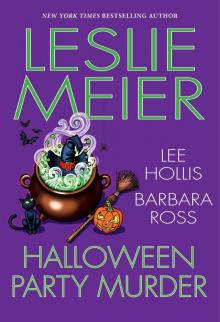 Halloween Party Murder
Halloween Party Murder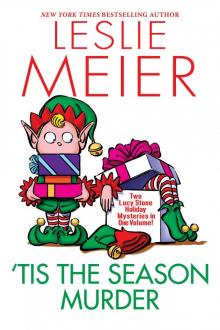 'Tis the Season Murder
'Tis the Season Murder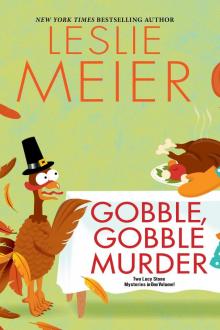 Gobble, Gobble Murder
Gobble, Gobble Murder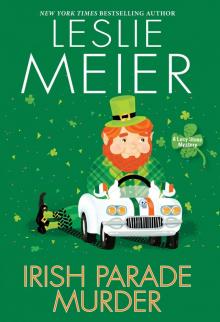 Irish Parade Murder
Irish Parade Murder Bake Sale Murder
Bake Sale Murder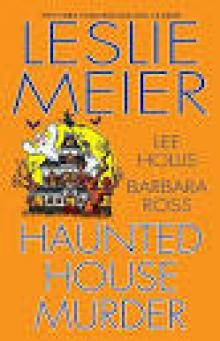 Haunted House Murder
Haunted House Murder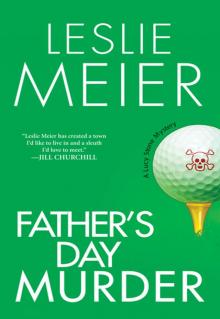 Father’s Day Murder
Father’s Day Murder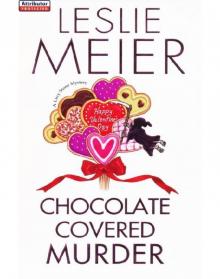 Chocolate Covered Murder
Chocolate Covered Murder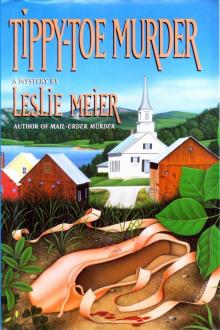 Tippy Toe Murder
Tippy Toe Murder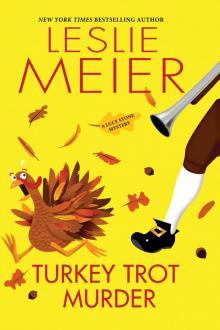 Turkey Trot Murder
Turkey Trot Murder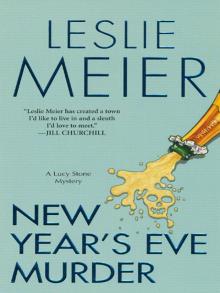 New Year's Eve Murder
New Year's Eve Murder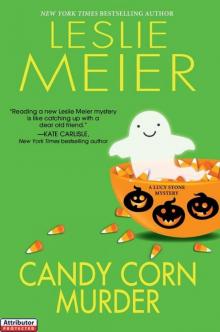 Candy Corn Murder
Candy Corn Murder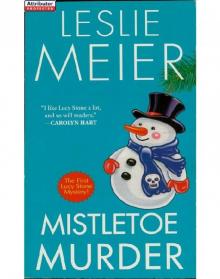 Mistletoe Murder
Mistletoe Murder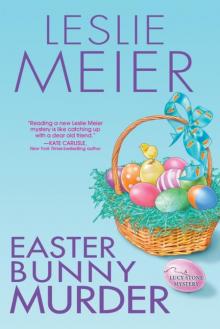 LStone 20 - Easter Bunny Murder
LStone 20 - Easter Bunny Murder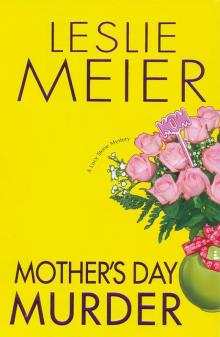 Mother's Day Murder
Mother's Day Murder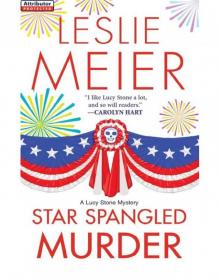 Star Spangled Murder
Star Spangled Murder Silver Anniversary Murder
Silver Anniversary Murder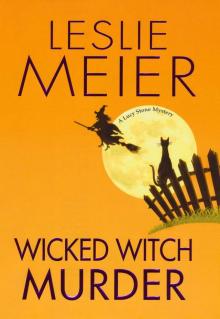 Wicked Witch Murder
Wicked Witch Murder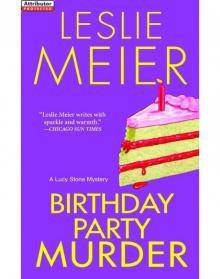 Birthday Party Murder
Birthday Party Murder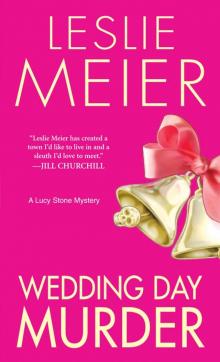 Wedding Day Murder
Wedding Day Murder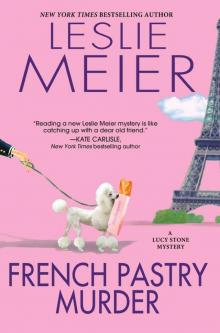 French Pastry Murder
French Pastry Murder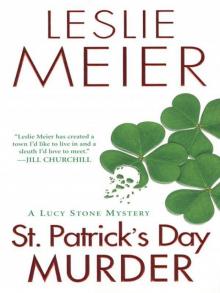 St. Patrick's Day Murder
St. Patrick's Day Murder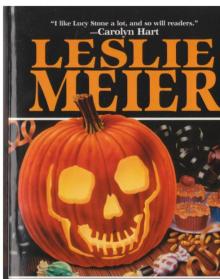 Trick or Treat Murder
Trick or Treat Murder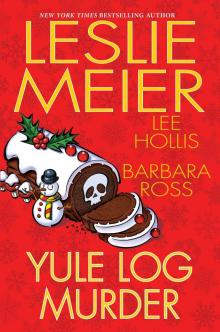 Yule Log Murder
Yule Log Murder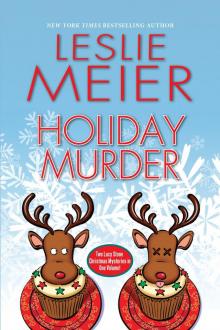 Holiday Murder
Holiday Murder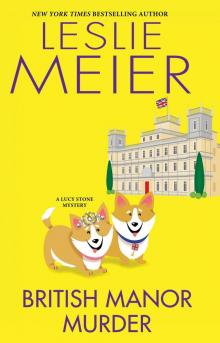 British Manor Murder
British Manor Murder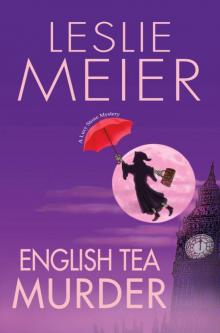 English Tea Murder
English Tea Murder